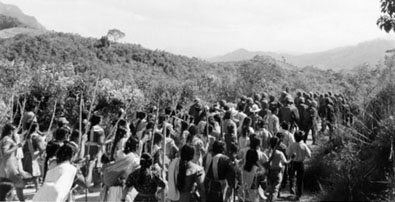History of Latin America
Native Americans and 'Neoliberalism'
Lecture outline
Readings: Monday: Vargas Llosa, "Questions of Conquest"
Thurs:
Miller Ch. 7
Quiz #4 Monday in Discussion
In the mid-1990s, the Zapatistas of Chiapas, Mexico, organized communities that declared their independence from the Mexican state. The military was sent in, and Chiapas state officials armed paramilitary troops to hunt down Zapatistas and sympathizers.
As was also true during the colonial era, women were often the ones who chased soldiers away. Above left, the community of Galeana in January 1998. Above right, X'oyep, Chiapas, June 1998. This photo by Mexican photographer Pedro Valtierra of the newspaper La Jornada won international awards.
The official Zapatista website
A different, middle class and primarily mestizo movement protesting the neoliberal policies of the 1980s and '90s in Mexico: the Barzonistas (click here for their official website in Spanish).
Survival International's report from 2000 gives some information about the Waiapi's fate in Brazil -- more recent news may be here. Just as in the colonial period, indigenous people learn the tools and language of the colonizers to protest their colonization. In this case, a young Waiapi translates an older cacique's statement against building a hydroelectric dam in their territory. UNESCO awarded Waiapi art "patrimony of humanity" status in 2002; Dominique Gallois appears in minute 3:40.
Water wars over utilities privatization in Cochabamba, Bolivia. Evo Morales is Bolivia's first democratically elected indigenous president; this critical summary of his economic policies calls him a "radical conservative."
CONAIE in Ecuador. A government plan asking for international donations to NOT drill for oil in the rainforest failed in 2013. For the visually inclined, a video report from the German national station Deutsche Welle.
Some success stories, so far: Ecotourism and other ventures, initiated and run by Oaxacan communities
with the aim of creating jobs that keep people from migrating, and preserving their local environment and way of life.

